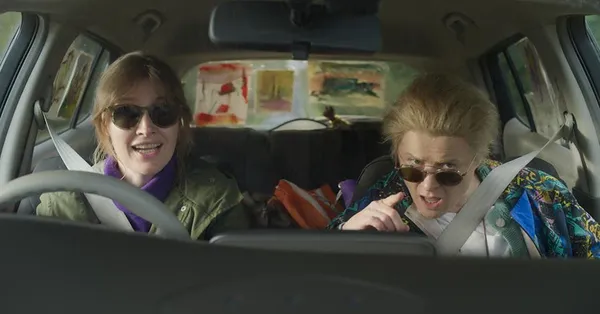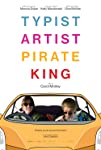Eye For Film >> Movies >> Typist Artist Pirate King (2022) Film Review
Typist Artist Pirate King
Reviewed by: Jennie Kermode

“I used to be in the kitchen sink school of realism but now I’m avant-garde and misunderstood,” says Audrey (Monica Dolan), hard at work in a small flat in which every surface is covered with her creations. Where plenty of successful artists talk volubly about their struggles with mental illness, she’s the real thing. What we see of her works may seem crude, but there’s no doubt that she’s put her heart and soul into them, or that they give expression to what has been a difficult life.
Showing appreciation gets care worker Sandra (Kelly Macdonald) no reward. Living with paranoid schizophrenia, Audrey sometimes gets confused about people’s identities, and the easiest way for her to be confident that Sandra is who she claims to be is to hear her criticise or complain. The result is a relationship built around sniping and passive aggression which wears Sandra out. One assumes that she has other clients like this, and she’s had enough. On the day that she decides to call it quite, however, Audrey asks her for one last favour. It seems churlish to refuse. They’re already in the car before she realises that the art exhibition to which she has agreed to drive her is not in another part of London, but in Sunderland – 280 miles away.

As both women are aware in their different ways, a care relationship is not the same thing as friendship. Sandra has been taught not to get emotionally caught up with clients, and understands the dangers of doing so. Audrey feels that she can’t fully trust anyone who works for the state, as she’s previously been held in a psychiatric institution against her will. Both women find it hard to maintain their barriers on a journey which ends up taking more than a day, Sandra driving her beloved little yellow car, Sunshine, as Audrey furiously scribbles away in her notebooks in the back seat. Along the way they stop off and have adventures, in the tradition of the road movie. Each is pushed out of her comfort zone and sometimes blames the other.
This might sound formulaic, but it stands out in two key ways. Firstly, the kind of adventures which develop around Audrey are, to say the least, unusual. At times she seems desperately vulnerable, at others borderline dangerous, but who else could be all alone, running away from danger, and suddenly find herself seated on a throne with an army around her? The second is that even before experiences like this have given Sandra a new found respect for her, she is presented as a character whose perspective is of equal value. She may seem strange to others but the world seems strange to her, and the strength with which she holds it at bay would be heroic in any terms.
The real Audrey died in 2013. Her art was discovered by her family when clearing out her home, and some of it is now on display at the Wellcome Collection in London. Director Carol Morley discovered it whilst studying there. There are many more sophisticated works in the collection – Audrey did have a couple of years of formal training under her belt – but in choosing to show us abstract doodles and context-free scrapbook items, she challenges viewers to think more deeply about what art and self expression mean, rather than simply perceiving this woman as someone who fell short of mainstream success. We see her as someone succeeding on her own terms.
There is no apology made here for Audrey’s more outré behaviour, and no attempt to sanitise her. On several occasions we are invited to laugh at things she does, but the same is true of Sandra, and the effect is to make them seem more rather than less human. For each of them, humour is an important coping mechanism. We also see examples of eccentric behaviour from all sorts of other people we meet along the way, who treat Audrey’s larger than life personality as an invitation to be more fully themselves. Whilst embracing her eccentricity, Dolan gives her character a pragmatic streak which often makes her seem more together than those around her, whilst Mcdonald brings a weight of suppressed emotion to Sandra, who makes the mistake of trying to bottle everything up to protect Audrey, only slowly coming to grips with the fact that, self-centred though she is, Audrey does care and can be there for her.
Much more of a natural crowd-pleaser than her previous works, this might be Morley’s most successful film to date. It has no less depth, and for all its sweetness, there’s a brittleness and urgency to it which might prompt viewers to reflect on the way we treat those people living amongst us who experience the world differently.
Typist Artist Pirate King (named for the entry under 'occupation' on Audrey's passport) screened as part of the 2023 Glasgow Film Festival.
Reviewed on: 08 Mar 2023

















